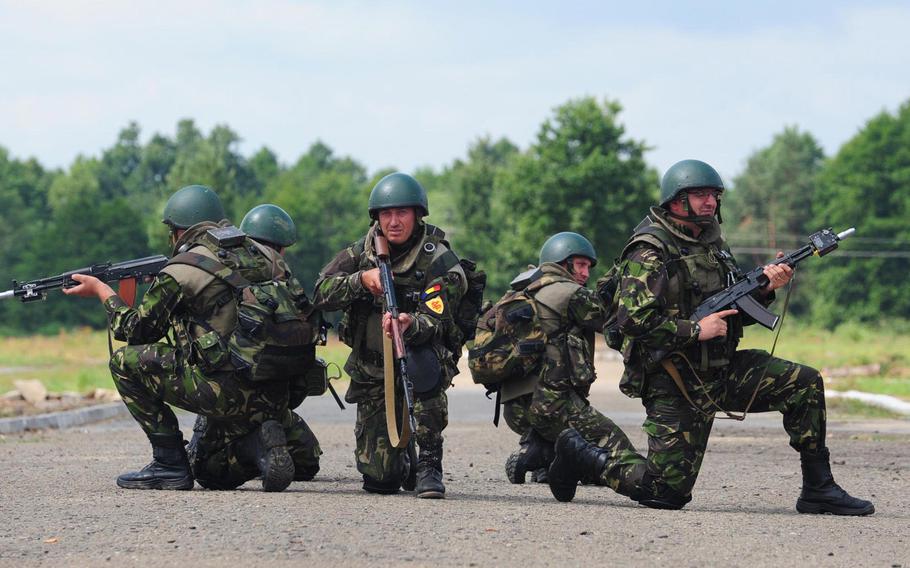
Romanian soldiers train on searching for roadside bombs during a training exercise led by Canadian forces July 12, 2013, during Exercise Rapid Trident in Yavoriv, Ukraine. The Pentagon is planning for cuts to a program used to help modernize the militaries of Ukraine and other former Soviet bloc states despite objections from U.S. European Command, which says the reductions will hinder security cooperation efforts in the region. (Daniel Cole/U.S. Army)
STUTTGART, Germany — The Pentagon is planning sharp cuts to a program to help modernize the militaries of Ukraine and other former Soviet bloc states despite objections from the U.S. European Command, which says the reductions will hinder security cooperation efforts in the region, according to a report from a Defense Department agency.
Money for the Defense Department’s Warsaw Initiative Fund is to be cut from $34 million to $24 million in 2015, according to budget documents posted by the Defense Security Cooperation Agency.
The funding now pays for about half of EUCOM's military engagements in many East European countries, stretching from Eurasia to the Balkans and the South Caucasus, the budget report says.
"Failing to restore WIF funding levels for USEUCOM will weaken their ability to complete their country cooperation plans' goals and objectives, and will also reduce their overall engagement with the PfP [Partnership for Peace] countries," the DSCA budget report says.
The Partnership for Peace Program is considered a stepping stone for countries seeking NATO membership.
The planned cuts come as EUCOM faces a new regional security challenge after Russia's annexation of Crimea, which has upended notions about security and stability in Europe.
According to DSCA, the demand for military partnerships with the U.S. and NATO continues to grow in former Soviet states. As the war in Afghanistan winds down, EUCOM has emphasized the need to enhance collaboration on training exercises with allies, particularly in the east.
"EUCOM pushed for restoration of funding levels and stated that WIF is a critical post-ISAF tool that will enable DoD to encourage defense reform and promote NATO interoperability and integration, especially among NATO aspirants," the DSCA report says.
While the Pentagon will continue to support the Warsaw fund, a budget crunch meant the program had to be examined to ensure top priorities are being met, military officials said.
The Pentagon said EUCOM can utilize other programs and funds to ensure objectives in Ukraine and across the region are achieved.
"U.S. European Command will continue to resource priority engagement activities within the program or supplement with other complementing funding sources," Navy Cmdr. Amy Derrick-Frost, a Defense Department spokeswoman, said in a statement.
She said that the Pentagon was “responding to a very challenging fiscal environment.”
Still, the Obama administration has indicated it intends to strengthen cooperation with allies in the east, raising the question of whether the administration could at some point seek to restore funding.
"We are exploring a number of additional steps to increase the pace and scope of our military cooperation, including rotating U.S. forces to the Baltic region to conduct ground and naval exercises – as well as training missions," Vice President Joe Biden said during a stop in Warsaw on Tuesday.